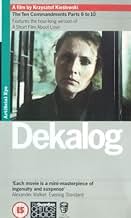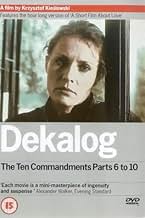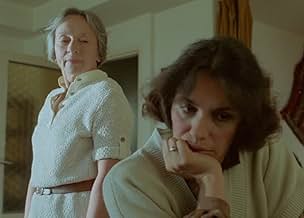Dekalog, osiem
- Episode aired Jun 22, 1990
- TV-MA
- 56m
IMDb RATING
7.5/10
3.9K
YOUR RATING
A researcher meets a professor and reveals herself as the child to whom she refused shelter during World War II.A researcher meets a professor and reveals herself as the child to whom she refused shelter during World War II.A researcher meets a professor and reveals herself as the child to whom she refused shelter during World War II.
- Director
- Writers
- Stars
Jerzy Schejbal
- Ksiadz
- (credit only)
Marek Kasprzyk
- Student
- (uncredited)
- Director
- Writers
- All cast & crew
- Production, box office & more at IMDbPro
7.53.9K
1
2
3
4
5
6
7
8
9
10
Featured reviews
'Dekalog': Part 8- The difficulties of truth amid evil and the sanctity of truth
'Dekalog' is a towering achievement and a televisual masterpiece that puts many feature films to shame, also pulling off a concept of great ambition brilliantly. Although a big admirer of Krzysztof Kieślowski (a gifted director taken from us too early), and who has yet to be disappointed by him, to me 'Dekalog' and 'Three Colours: Red' sees him at his best.
All of 'Dekalog's' episodes have so many great things, and it is an example of none of the lesser episodes being bad. This is testament to the high quality of 'Dekalog' as an overall whole and how brilliant the best episodes are.
Episode 8 may be one of the weaker 'Dekalog' episodes, but it is still very good. With it being the simplest of all ten stories, it is not quite as thematically rich or as emotionally impactful as some of the others, and the other commandments explored with a little more naturalness.
Every single one of 'Dekalog's' episodes are exceptionally well made. The production values in Episode 8 are as ever atmosphere-enhancing, beautiful and haunting to look at and fascinating, definitely cannot be faulted on the technical front. The direction is quietly unobtrusive, intelligently paced and never too heavy, and the music is suitably intricate.
The characters are still interesting and their interactions and relationships with each other resonate. Even though most of the other episodes are richer thematically, Episode 8's themes are still explored intelligently and without any preachiness and there are some very atmospheric and moving moments (just not quite as much as the previous episodes). The acting is superb as to be expected, with complexity and nuances by the bucket-load.
To conclude, may be one of the weaker 'Dekalog' episodes but it is still very good. 8/10 Bethany Cox
All of 'Dekalog's' episodes have so many great things, and it is an example of none of the lesser episodes being bad. This is testament to the high quality of 'Dekalog' as an overall whole and how brilliant the best episodes are.
Episode 8 may be one of the weaker 'Dekalog' episodes, but it is still very good. With it being the simplest of all ten stories, it is not quite as thematically rich or as emotionally impactful as some of the others, and the other commandments explored with a little more naturalness.
Every single one of 'Dekalog's' episodes are exceptionally well made. The production values in Episode 8 are as ever atmosphere-enhancing, beautiful and haunting to look at and fascinating, definitely cannot be faulted on the technical front. The direction is quietly unobtrusive, intelligently paced and never too heavy, and the music is suitably intricate.
The characters are still interesting and their interactions and relationships with each other resonate. Even though most of the other episodes are richer thematically, Episode 8's themes are still explored intelligently and without any preachiness and there are some very atmospheric and moving moments (just not quite as much as the previous episodes). The acting is superb as to be expected, with complexity and nuances by the bucket-load.
To conclude, may be one of the weaker 'Dekalog' episodes but it is still very good. 8/10 Bethany Cox
What a shame ! ! ! Mysterious are the vagaries of human mind.
Dekalog 8: "Thou Shalt Not Bear False Witness" is a short film which will surely move any human being with heart to tears.By making this film,one of the greatest masters of Polish cinema Kieslowski has given birth to a highly mature work of art which needs to be seen at regular intervals to fathom the true meaning of human existence found in human heart.One can learn that there is no yardstick by which greatness or wickedness of an individual,a society,a nation or a religion can be measured.Everybody has reasons to accept or decline a good action."Dekalog,Osiem" suggests that individual sense prevails sometimes over a good act.Rules have to be broken on some occasions to save precious,human lives.It is a human instinct that old memories cannot be separated from human soul.This is the reason why old memories induce people to visit places where they could have died,see a house where they were hidden,meet a person who saved a life.This short film is remarkable for its depiction of young Polish university students.It is a good sign that young generation have been shown as interested in tackling ethical and moral questions.It is hard to say whether Kieslowski had ideas about the liberation of communist Poland in his mind when he was making this film.
10Aquilant
A woman haunted by the memories of her unhappy childhood.
Dekalog 8 introduces a debate about a situation described in the second episode of the series, with regard to some interesting researches about thematic morals made in an unadorned lecture hall. As in a game of mirrors, Kieslowski's magical poetry proposes subtle allusions, references, previous solutions analysed under different points of view.
The analysis of Elzbieta's personal story framed within the context of her restless past and recalled in the light of her present time made of painful and unavoidable confrontations proposes the harassing thought about our duty to God, about our moral obligations towards the Christian commandment, "Thou shalt not bear false witness against thy neighbour". Is it possible to be merciful to our fellowmen even at the risk of violating the dictates of divine commandments? Are we allowed to help people even if we are aware about the incompatibility between the ethical principles applied to the evidences of religion and the intention of "bearing false witness against our neighbour" to a good purpose? Is it really possible to give up the idea of getting out of the clutches of the Nazi police a six-year-old Jewish child in the desperate need of a certificate of baptism only on account of moral and religious scruples? The dramatic explanation between Elzbieta, haunted by the memories of her unhappy childhood, and Zofia, the elder woman who refused to give her a passport to safety many years ago, call to our minds a sense of bewilderment and affliction.
Both of them are afraid of something going up in smoke around them and nothing escapes their remembrances of a painful past. Sad remembrances of course, because nothing hurts like the truth. Crude in the same manner as a vivisection of the soul. Conjured up with surgical precision in the coldness of an utterly impersonal ambient. Maybe only a cathartic face to face between the two women would give life to new friendly relations made of comprehension, explanations, reconciliations. Kieslowski divides all humanity into two parts: the saviors and the saved. His strict dialectics traces all the uneven steps of the story in a very subtle way. He likes to give back to human dignity its state of primitive and natural innocence, deeply upset by a pressing sense of misinterpreted obedience to the precepts of the Church.
The analysis of Elzbieta's personal story framed within the context of her restless past and recalled in the light of her present time made of painful and unavoidable confrontations proposes the harassing thought about our duty to God, about our moral obligations towards the Christian commandment, "Thou shalt not bear false witness against thy neighbour". Is it possible to be merciful to our fellowmen even at the risk of violating the dictates of divine commandments? Are we allowed to help people even if we are aware about the incompatibility between the ethical principles applied to the evidences of religion and the intention of "bearing false witness against our neighbour" to a good purpose? Is it really possible to give up the idea of getting out of the clutches of the Nazi police a six-year-old Jewish child in the desperate need of a certificate of baptism only on account of moral and religious scruples? The dramatic explanation between Elzbieta, haunted by the memories of her unhappy childhood, and Zofia, the elder woman who refused to give her a passport to safety many years ago, call to our minds a sense of bewilderment and affliction.
Both of them are afraid of something going up in smoke around them and nothing escapes their remembrances of a painful past. Sad remembrances of course, because nothing hurts like the truth. Crude in the same manner as a vivisection of the soul. Conjured up with surgical precision in the coldness of an utterly impersonal ambient. Maybe only a cathartic face to face between the two women would give life to new friendly relations made of comprehension, explanations, reconciliations. Kieslowski divides all humanity into two parts: the saviors and the saved. His strict dialectics traces all the uneven steps of the story in a very subtle way. He likes to give back to human dignity its state of primitive and natural innocence, deeply upset by a pressing sense of misinterpreted obedience to the precepts of the Church.
Maria Koscialkowska
Like "Dekalog, jedem", it is one of the most powerful episode of the serie for me. The admirable performance of Maria Koscialkowska, the beautiful work of Teresa Marczewska as Elzbieta , reminding the performance of Krystyna Janda in "Dekalog ,dwa" are the lead virtues. The reference to the dilemma of Dorota Geller is, for same reason, a significant clue. In same measure, it is an episode about Shoah and its shadows, about fear and about resurrection of past price. About a decision and its profound, hidden roots. About the expected word. A special film. For the exploration of the memories of the viewer.
10sfuss
Simple and Terrific
With a minimum of histrionics, this film tells a simple story about the legacy of the holocaust in Poland.
A college professor who once turned away a little Jewish girl who sought refuge is confronted by that same girl -- now in her forties -- and must explain to her the real reason for turning her away. While the two women are able to forge a deep friendship, the man (a tailor) who risked his life to try and save the girl has become, with time, too closed off to allow her to form any sort of bond with him. The film's last image, of the lonely tailor looking out the window of his shop to see the professor and her friend laughing together, has the same straight forward and unassuming emotional wallop that ends many of Kieslowski's films.
This may be the best fictional film ever made about the holocaust.
A college professor who once turned away a little Jewish girl who sought refuge is confronted by that same girl -- now in her forties -- and must explain to her the real reason for turning her away. While the two women are able to forge a deep friendship, the man (a tailor) who risked his life to try and save the girl has become, with time, too closed off to allow her to form any sort of bond with him. The film's last image, of the lonely tailor looking out the window of his shop to see the professor and her friend laughing together, has the same straight forward and unassuming emotional wallop that ends many of Kieslowski's films.
This may be the best fictional film ever made about the holocaust.
Did you know
- TriviaAll entries contain spoilers
Details
Contribute to this page
Suggest an edit or add missing content




















